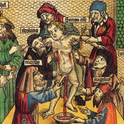Last month in Jerusalem, I discovered that the British scarcely occupy a place of honour in Yad Vashem, the Holocaust museum. The Avenue of Righteous Gentiles, which leads up to the memorial to the million and a half children who died, commemorates many and all too few names. I saw no Lord Portland or Anthony Eden among them. Nor is the Labour government of 1945 unduly venerated. Yad Vashem insists that the British throttled entry to Palestine and repelled the overloaded ships which brought the surviving scum of the earth to the land promised to them both by their God and by Lord Balfour. As for "sending Jews back," which William Rubinstein insists never happened during the war, it certainly did happen after it: "illegal immigrants" to Palestine were returned to the same German camps from which they had earlier been liberated.
Rubinstein alleges the innocence of the British and the Americans of any passive collusion with the Germans. In particular, he acquits them of officially denying entry to refugees. In terms of formal document, he may indeed have searched in vain. A disreputable Hollywood joke tells of St Peter at the gates of heaven, assuring new arrivals of the non-discriminatory policy of the celestial authorities which now require entrants to pass a one-word spelling test. He then asks a catholic bishop to spell "cat" and a protestant banker to spell "mat." Next in line is a Muslim. He is asked to spell chrysanthemum. In the same reasonable spirit Jews from Nazi Germany were required, as a matter of routine, by US immigration officers, to supply written evidence of good conduct from their local Gestapo. If, as Rubinstein claims, there was no impediment to entry, why did Billy Wilder have to argue his way into the US through a consulate in Mexico? The consul was sympathetic, but was officially forbidden to admit a man whose profession was screenwriting. He asked whether Billy had any other, more attractive talent (plumbing?) but Billy said that, unfortunately, all he could do was write movies. Side-stepping the guidelines, the consul finally stamped Wilder's papers, saying: "Write some good ones."
the wickedly versatile Talleyrand once said that no one who had not lived under the ancien r?gime would ever know what true douceur de vivre was. Similarly, although in contrast, no Jew (such as William Rubinstein?) who was not alive before 1948, when the state of Israel was founded, will ever know what it was to inhabit a world in which indifference was the happiest reception a rootless cosmopolitan could expect. Nor has the climate wholly changed. Our new MP, Alan Clark, refers very amusingly in his diaries to "Jewish racing yellow" as the colours under which the chosen competed at Brookland. He also tells us, sportingly, of the code which he and his fellow followers use to refer to the late lamented Adolf Hitler. It's such a good thing to have a sense of humour.
jews have often been accused of dual loyalties. It is, on the whole, a charge too old and too trite to be worth answering. It tends to come from those who, like the flogging moralists of antique public school lore, expected their victims not only to endure their stripes without complaint but also to kiss the rod and say thank you to its wielder. The existence of Israel has now given rise to a new Jewish vice: dual disloyalties. If we cannot quite believe that Britain and the US were waiting, with open quotas, for any plucky yids who managed to stumble to their shores, no more is it possible to be an unmitigated supporter of the policies-and myths-of today's Jewish state. It is part of the unsubtle diplomacy of right-wing Israelis to accuse diaspora critics of the Netanyahu government of dancing to anti-Semitic tunes. How can anyone who does not live in Israel, and never served in the IDF, dare to take issue with what its elected prime minister decides is best? The argument has some force, but it ignores how many Israelis are now watching "Bibi" with, at the least, apprehension. The fact that he studied economics in the US, and speaks English with a handsomeness which Menachem Begin did not quite achieve, makes Netanyahu seem a good thing. However, Begin's "terrorist past" did not prevent him from making a wise deal with Sadat which still holds, however tenuously, and did bring peace of a kind. Netanyahu has an elegant delivery, but seems to have no plans, save for his own political survival. He certainly has no conception of the possible dividends, let alone the beauty, of magnanimity. The liberal, secular Israelis with whom I spoke are-like the Arabs in whose excellent Bethlehem restaurant we had lunch, and the Palestinian Christian doctor who treated me in Tiberias-as pessimistic about the future as the ultra-orthodox are fatuously exultant. What kind of loyalty could make one unashamed on seeing a shrine, as we did in his settlement near Bethlehem, to the "sainted" Baruch Goldstein, who murdered 29 Hebron Arabs as they prayed? (The Israeli government is paying, it should be noted, considerable damages to the victims' families.)












